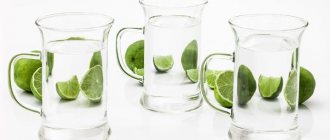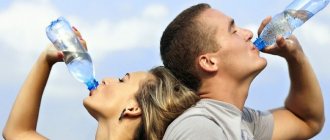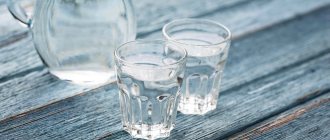From this article you will learn:
- Determination of water and electrolyte balance
- Causes of water imbalance
- Symptoms of lack of water in the body
- Methods for diagnosing water imbalance
- 7 tips for restoring water balance in the human body
- 10 recommendations for maintaining water balance in the human body
- Formula for calculating the required amount of water by weight
The balance of water in the human body is very important. For clarity, let's look at the numbers: water makes up 60-80% of the total mass of the entire body, its main part is contained in cells. The brain consists of 80% of it, blood - 92%, gastric juice - 99%. Therefore, water imbalance leads to serious disorders and health problems.
In this article, we have collected valuable information that will help to detect a lack of fluid in the body in time, as well as prevent it. You will learn about healthy habits and will be able to calculate the amount of water you need daily by weight.
Determination of water and electrolyte balance
Determination of water-electrolyte balance
The ratio between the amount of water entering the body and the amount removed from it over the same time period is considered water-electrolyte balance. With normal operation of all organs and systems, there should be no difference between these indicators. At the same time, lack of water leads to negative consequences. A person with impaired water balance notes a deterioration in concentration and a decrease in the speed of solving logical problems.
Normally, the amount of fluid released by the body should be equal to that received. If you don’t drink enough water during the day, the balance will be negative, as a result, the metabolism will slow down, the blood will become thicker, will not cope with the distribution of oxygen, the pulse will increase and the body temperature will rise. That is, our body will receive additional stress, but overall performance will decrease.
But exceeding the daily norm is also unsafe. The blood thins, resulting in increased stress on the cardiovascular system. The concentration of gastric juice decreases, which leads to disturbances in the digestive processes. With such a violation of the water balance in the human body, the load on the excretory system increases - excess fluid is excreted through sweat and urine. Not only the kidneys suffer, they work too hard, many useful substances are removed from the body. As a result, the water-salt balance is disrupted, which weakens the body.
You should not drink a lot and during increased physical activity. Due to severe muscle fatigue, you can feel cramps. If you have noticed, athletes do not drink water during training and performances, but only rinse their mouths to avoid stress on the heart. This technique can be taken into account while jogging or training.
How much water to drink
The water calculator clearly shows how much water you should drink per day. Different countries have their own standards, but they are close to each other. The oldest rule - 8 glasses a day or 2 liters of water - actually meant drinking 1 ml of water per 1 calorie burned, compared to the 1900 calorie norm in 1945. In this case, adjustments should be made for the ambient temperature, physical activity, types of food consumed, and the state of the body.
What kind of water should I drink?
Definitely – pure, without impurities and chemical additives. However, there is a huge difference even between boiled and raw water. Boiled water loses a large number of beneficial properties; distilled water does not even conduct electricity. Water in its original “raw” form is a rich set of microelements necessary for the human body and, at the same time, depending on its composition, it is a very ambiguous helper. Scientists have proven the negative impact on human health of water with increased hardness, excessive mineralization, and low acidity.
How to drink water correctly?
If you feel dry mouth, this is already dehydration. To avoid lack of water, you need to drink about 1 glass of water per hour. The body is not able to process more than 1 liter of water per hour. Therefore, you should drink water throughout the day, including the evening. If you recently ate, but are hungry again, in fact you are thirsty, we simply interpret the body’s signals incorrectly.
Why drink water?
Water is a liquid with properties that make it an ideal solvent in which most of the substances necessary to maintain the normal functioning of the body are dissolved. This is the biological environment in which both metabolism and almost all biophysical and biochemical reactions that ensure the functioning of the body are carried out. Water performs a transport function - it carries nutrients, metabolic products, enzymes, antibodies, and gases. With its help, residual metabolic products are removed from the body, thermoregulation is carried out - heat is released through the lungs and from the surface of the skin in the form of sweat evaporation. The condition of the skin also depends on water - when dehydrated or consumed contaminated water, the skin becomes less elastic, wrinkles appear and the surface layers of the epithelium peel off.
Are coffee, tea, juice included?
The International Institute of Sports Medicine believes that you should drink a certain amount of pure water, while everyone else includes water from food and drinks in this norm. But do not forget that coffee and alcohol dehydrate the body, and they must be compensated with clean water. Juices and soft drinks contain a lot of sugar and add unnecessary calories with water.
How to drink water during training?
General recommendations:
- Before training:
- 2 glasses of water 2-3 hours before training
- 0.5 glasses of water 10-15 minutes before start
- Weigh yourself
- During training:
- 0.5 glasses of water every 15 minutes of exercise
- If exercise is performed for more than 1.5 hours, drink 0.5 sports drinks every 15-30 minutes
- After training:
- Weigh yourself and compare your weight to your pre-workout weight.
- Every kilogram lost must be compensated with 3 glasses of water.
Can you lose weight if you drink water?
- According to recent studies, drinking 500 ml of water can temporarily speed up metabolism by 24-30%.
- 2 liters of water per day can burn an additional 96 calories.
- Drinking a glass of water half an hour before eating can reduce the amount of food you eat. The study found that weight loss dieters who drank 500ml of water before meals lost 44% more weight over 12 weeks than those who didn't drink water.
Why drink water when losing weight
- Weight loss at the beginning of a diet is largely due to water loss, so you need to drink water to avoid dehydration.
- Burning calories requires a certain amount of water; if there is a lack of it, the fat burning process slows down.
- When calories are burned, various toxins are formed in the body, and water flushes them out of the body.
- Water is a lubricant for joints and maintains muscle tone. Lack of water reduces blood volume, and therefore the supply of oxygen to the muscles.
- With a healthy diet, a person gets more fiber from food, and water helps the digestive tract process it.
Causes of water imbalance
Causes of water imbalance
The water-salt balance is disrupted when fluid is improperly distributed throughout the body or when there is a large loss of fluid. This leads to a deficiency of microelements that are responsible for metabolic processes.
The calcium concentration may drop sharply for the following reasons:
- absence of the thyroid gland or failure of its functioning;
- when treated with medications containing radioactive iodine.
Sodium concentration may also decrease for the following reasons:
- excessive accumulation of fluid in body tissues due to various pathological conditions or when the daily water intake is exceeded;
- therapy with diuretics (especially without permission, without the supervision of a doctor);
- development of pathological conditions accompanied by increased urination (diabetes, for example);
- conditions that occur with fluid loss (increased sweating, diarrhea, etc.).
Pathological potassium deficiency sometimes occurs due to alcohol abuse, corticosteroid use, or conditions such as:
- insulin therapy;
- liver failure;
- decreased performance of the thyroid gland;
- malfunction of the adrenal glands;
- general alkalization of the body.
This is interesting!
“ORP of water: norm and methods of obtaining healthy water” Read more
But exceeding the norm of potassium can also upset the balance of water in the human body.
Types of dehydration
Depending on the balance of fluid and salts, three types of dehydration are distinguished:
Isotonic.
This type of dehydration is characterized by a uniform loss of water and electrolytes through vomiting, diarrhea, bleeding, and excessive diuresis.
Hypertensive.
Occurs when hypotonic fluid is lost. Since water loss comes from the extracellular space, the concentration of electrolytes there increases. The condition occurs when there is increased loss of fluid through the respiratory system during shortness of breath and through the skin during fever and excessive sweating.
Hypotonic.
Occurs when sodium salts are lost. Too little of it causes water loss. The fluid moves into the cell, which causes dehydration of the intercellular space. Possible while taking diuretics (salts are lost), with kidney disease.
Symptoms of lack of water in the body
Symptoms of lack of water in the body
As noted above, the human body consists of approximately 80% water. And when the water balance changes even by 3-5%, this manifests itself as:
- headaches;
- rapid heartbeat;
- blood pressure surges;
- weakness, drowsiness, decreased productivity;
- dry skin, the appearance of clear and deep wrinkles;
- swelling of the face and lower extremities;
- exacerbation of chronic diseases;
- decreased immunity and increased incidence of colds;
- sensations of dry mouth and thirst;
- the appearance of bad breath;
- sensation of tongue being coated;
- decreased brain activity: depression, sleep disturbances, attention problems;
- joint pain and muscle spasms;
- feelings of nausea and constipation.
If a water deficit of 10% of the norm occurs, a person must be immediately hospitalized, his condition is assessed as severe dehydration.
But each body reacts differently to water imbalance. These may be all of the symptoms listed above or only some of them. In some cases, a person does not feel anything at all, and after a while his condition worsens sharply.
Myth or truth?
The opinion that the human body consists of 2/3 water was strengthened as a result of a series of inhumane experiments on prisoners in concentration camps. In 1940, in one of the fascist camps, Colonel Yaguchi of the Japanese Imperial Army conducted experiments on prisoners. The prisoner was placed on a chair in a closed room, tied up, and then subjected to a constant flow of dry, hot air. After 7 hours, the person died from dehydration; after 9 hours, the body turned into a dried-out skeleton. The weight of this “mummy” was 20-22% of the original. It is unlikely that such a method can be considered scientific evidence.
Methods for diagnosing water imbalance
Methods for diagnosing water imbalance
Our body tries in every way to maintain water balance. This is possible only in two ways: by regulating metabolism (to slow down water use) and by generally reducing fluid output during urination.
It is difficult to independently understand what the water balance in the human body should be without additional research methods. Perhaps this is only based on indirect evidence, observing the indicators of water excretion by the body.
Dehydration may be indicated by the sour smell of sweat and its viscous consistency. The next indicator is urine volume. It should be at least 1.5 or 2.5 liters per day. Color and smell do not matter; they can fluctuate throughout the day, but the quantity must be stable.
Another method is weighing on bioimpedance scales. They are always available in nutritionists' offices. The scale displays how hydrated the body is, the percentage of bone, muscle and fat mass, as well as a person’s biological age.
But you can accurately find out the body’s water balance and get clear indicators only in the clinic by taking the appropriate blood and urine tests, which, if necessary, are prescribed by a nutritionist.
Recommendations
Experts determine the required amount of fluid for each person based on his weight. The more a human body weighs, the more fluid it must consume. The norm for a man weighing over 70 kg is to consume up to 2-2.5 liters of water per day. Women weighing 45 to 65 kg should drink 1.25-1.5 liters of water daily.
To avoid dehydration, it is recommended to drink pure water, avoiding tea, coffee or carbonated drinks. To check the water level at home, just pinch yourself on the top of your palm. If the skin returns to its original appearance after a few seconds, then the fluid level in the body is normal. If a red spot remains, you should consume more water.
The human body is mostly composed of liquid. Water is necessary for the normal functioning of internal organs and maintaining vitality. An acute shortage of it leads to death.









